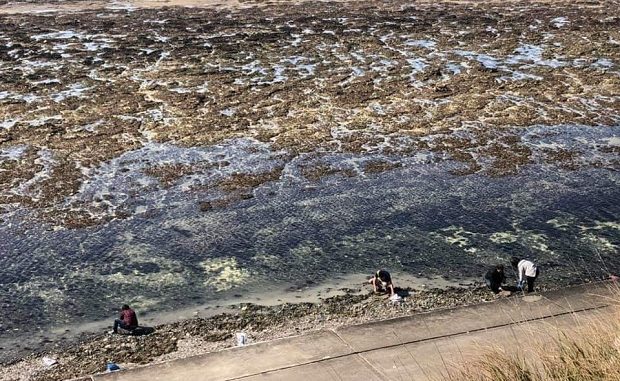
Thanet Coast Project is asking for information to help gauge the amount of commercial collecting and harvesting of shellfish that is taking place on isle beach areas.
It follows concerns raised of shellfish being taken in bulk from sites including Epple Bay, Westbrook, Westgate and Beresford Gap.
The collecting of shellfish is not illegal but there rules around bulk harvesting, the collection for public consumption and ensuring the chalk reef is not damaged.
Enforcement issues fall under the remit of a number of organisations including Gangmasters & Labour Abuse Authority for reports of large groups being used to make the collections: Thanet council environmental health for concerns large quantities of hand harvested oysters or cockles are being sold to the public or to a local food business; Natural England via Kent Police on 101 for damage to the chalk reef and the Kent & Essex IFCA for the collection of periwinkles by mechanical means (other than by hand), native oysters collection, or large scale cockle harvesting.
There are often reports of commercial foraging around the coastline and these need to be recorded in order for them to be monitored.
The Thanet Coast Project post says: “Please help us to gauge how many of these activities are taking place around our coast.
“If you see any commercial collectors and harvesters please use the online form to record activities taking place on the Thanet Coast (from Whitstable around Thanet to Sandwich Bay) – noting the time and date; location and number of collectors.
“Reports can be sent in by any member of the public, organisations or water user clubs and authority staff and will go into a local database to inform the main authorities with duties to manage shellfisheries and the coastline within the NE Kent Marine Protected Area (NEKMPA).”

Guidelines for shellfish collecting as an individual are:
- Tread carefully to avoid damage to the rocky chalk shore especially on the lower shore where the chalk is most fragile
- Always put rocks and seaweed back the way they were – there are animals underneath which need them for shelter.
- Shellfish should be collected by hand only (not mechanical means) and without breaking the chalk rocks (Local Sea Fisheries bylaws allow for the collection of periwinkle by hand only)
- Take only enough for your own needs to ensure that many are left for other collectors and the species can still thrive
- Select only the larger shellfish to ensure that younger ones can continue to grow on and establish the next generation
- Take care to avoid putting feeding or roosting birds to flight
- Avoid collecting shellfish during ‘Temporary Prohibition Orders’ (Fishery Products and Live Shellfish) when it is a criminal offence to collect live shellfish such as cockles and mussels for human consumption on the grounds of public food safety. Contact your local authority for further information
- Abide by food safety standards and ‘guidelines for safe working in estuaries and tidal areas’ (Health and Safety Executive)
Find the online form at https://bit.ly/2LnGZWf

